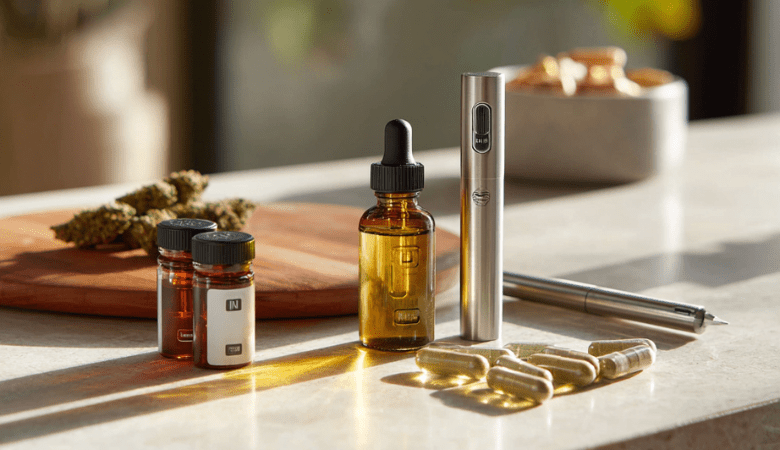Your Cart is Empty
FREE SHIPPING ON ALL ORDERS $75+
If you're curious about whether you can take Kanna and Delta-9 THC together, you're not alone. Many inexperienced consumers want to understand how these two substances might interact, whether it's safe, and what effects to expect. This article provides a clear, research-based overview to help you make an informed decision.
Can you take Kanna and Delta-9 together? Many users report combining them safely, but it requires caution due to potential interactions affecting mood and perception.
Safety first: Both substances influence brain chemistry differently; starting with low doses is essential to minimize adverse effects.
Know the effects:Combining Kanna and Delta-9 may enhance relaxation and euphoria but could also amplify anxiety or dizziness in sensitive individuals.
Before diving into combining Kanna with Delta-9 THC, it's important to understand what Kanna is. Kanna (Sceletium tortuosum) is a succulent plant native to South Africa, traditionally used for mood enhancement and stress reduction. It contains alkaloids such as mesembrine that can affect serotonin pathways in the brain, promoting feelings of calm and happiness.
Kanna is available in several forms, including capsules, tinctures, teas, and powders. If you’re new, check out our kanna dosage guide to understand safe starting amounts.
Delta-9 tetrahydrocannabinol (Delta-9 THC) is the primary psychoactive compound in marijuana. It binds to cannabinoid receptors in the brain, producing the “high” associated with cannabis use. Effects include altered perception, euphoria, relaxation, and sometimes anxiety or paranoia.
Currently, there are no clinical studies directly examining the interaction between Kanna and Delta-9 THC. However, understanding their individual effects and mechanisms can help predict potential outcomes:
Kanna’s Impact: Acts mainly on serotonin and dopamine systems, promoting mood stabilization and mild euphoria. Learn more about kanna’s effects here.
Delta-9’s Impact:Targets cannabinoid receptors, affecting memory, mood, and perception.
Combined Effect:Theoretically, combining a serotonin-modulating herb with a psychoactive cannabinoid could increase euphoria or relaxation but might also raise the risk of anxiety, dizziness, or overstimulation.
Online forums and anecdotal reports suggest a variety of experiences:
Enhanced relaxation and mood lift
Increased sociability and reduced social anxiety
A more balanced, less “foggy” high compared to THC alone
Increased dizziness or lightheadedness
Heightened anxiety or paranoia in sensitive users
Nausea or stomach discomfort when taken on an empty stomach
If you want to maximize benefits while avoiding discomfort, see our guide on the best time to take kanna.
If you’re considering combining these substances, keep these best practices in mind:
Start low and go slow:Use the lowest effective doses of each to assess your individual tolerance.
Avoid mixing with other CNS depressants:Alcohol or other sedatives could increase risks.
Stay hydrated and in a safe environment:Especially if you are new to either substance.
Do not drive or operate heavy machinery:Until you know how the combination affects you.
Consult a healthcare professional:Particularly if you take medications or have mental health concerns. More on kanna safety.
If you want mood enhancement or relaxation but are unsure about mixing Kanna with Delta-9 THC, consider these alternatives:
Kanna alone:For mild mood support without the psychoactive effects of cannabis.
CBD (Cannabidiol):Non-intoxicating cannabis compound known for calming effects without the high.
Adaptogens like Ashwagandha or Rhodiola: Natural herbs that support stress relief and mood balance.
Mindfulness and breathing exercises: Non-substance approaches to reduce anxiety and improve mood.
Forms:Capsules and tinctures provide controlled dosing; teas and powders can be more variable. Learn the basics in our how to take kanna guide.
Timing: Many prefer taking Kanna on an empty or lightly filled stomach for faster onset.
Dosage:Typical doses range from 50 mg to 200 mg of standardized extract, but always start with less.
Frequency: Avoid daily use to prevent tolerance build-up.
In short, yes, many users can take Kanna and Delta-9 together, but it requires caution and responsible dosing. Because both substances affect brain chemistry in different ways, combining them may enhance positive effects like relaxation and mood uplift — or it might increase the risk of side effects like anxiety or dizziness.
If you are inexperienced, begin with low doses and monitor how your body reacts. Always prioritize safety and seek professional advice if uncertain. Also, note that laws vary — check if kanna is legal where you live.
Have you tried combining Kanna with Delta-9 THC? Share your experience or questions below!
Avoid mixing Kanna with other serotonergic substances (like SSRIs, MAO inhibitors), alcohol, or sedatives to prevent adverse interactions such as serotonin syndrome or excessive sedation.
Medications that depress the central nervous system (CNS), blood thinners, and certain psychiatric drugs may interact negatively with Delta-9 THC. Always consult a doctor before combining.
Yes, many people combine CBD and Delta-9 THC. CBD may reduce some of THC’s psychoactive effects and help with anxiety, making the combination popular for a balanced experience.
Kanna is mildly psychoactive. It can elevate mood and produce mild euphoria but does not cause the intense “high” typical of cannabis.
Kanna influences serotonin and dopamine pathways, which can improve mood, reduce anxiety, and promote relaxation. If you’re curious about its nootropic potential, see our article on kanna for cognitive enhancement.
People on antidepressants or other serotonergic medications, pregnant or breastfeeding women, and individuals with certain mental health conditions should avoid Kanna unless supervised by a healthcare provider.
Comments will be approved before showing up.
